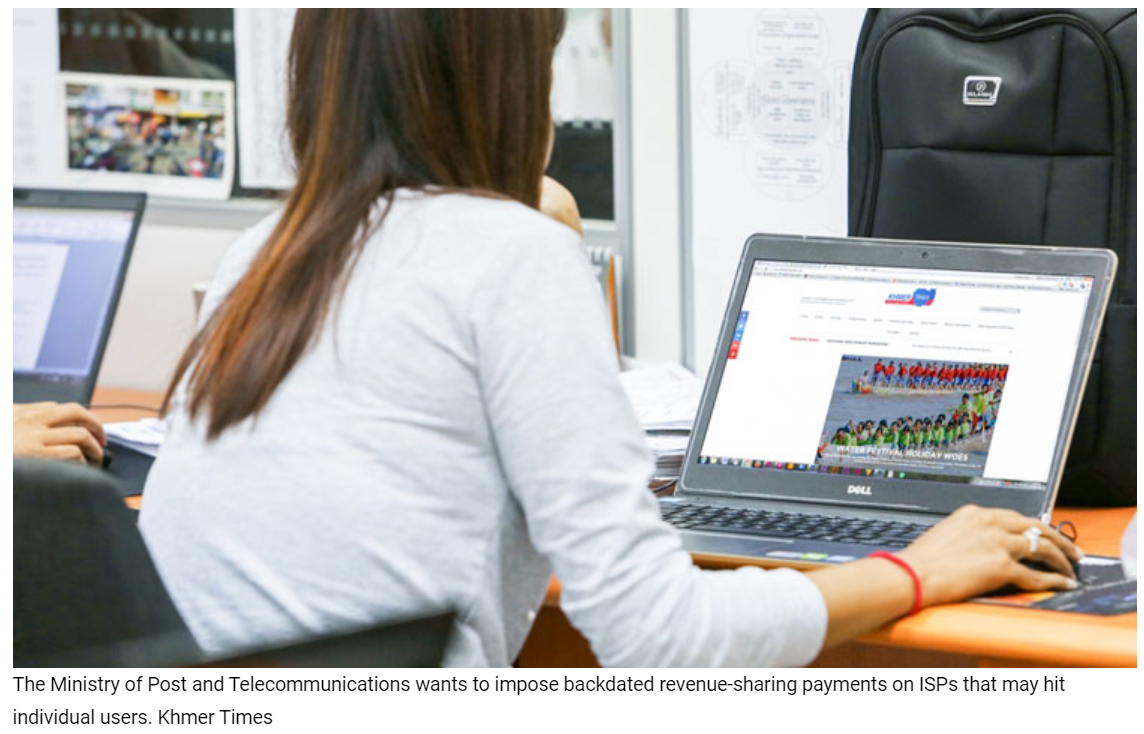Cambodia: Netizens could end up paying fines dating back years: ISPs
Cambodian internet service providers (ISPs) are warning that their customers may be forced to bear the brunt of hefty penalties levied on ISPs by the Ministry of Post and Telecommunications (MPTC).
An executive at a leading ISP told Khmer Times under the condition of anonymity that the MPTC audited ISPs earlier this year and found that every firm had allegedly been miscalculating revenue shares due to the government since 2017. As a result, ISPs are being told that they must pay not only the principal owed but also interest and tax.
Telecommunications operators are required to share revenues and dividends with the MPTC. Older licensees often pay higher fees. The exact percentage shared by operators and the Telecommunications Regulator of Cambodia varies case-by-case. However, the new rate will see a substantial portion of total revenue and an additional 10 percent in value-added tax deducted from bottom lines.
“We have been calculating our revenue sharing the same way for the past decade. Now the new [MPTC] team has come in and said we are calculating it incorrectly and going back to 2017 to recalculate and charge the difference. The total owed is compounded with 2 percent interest per month, which doubles the so-called ‘balance due’,” the source said.
ISPs have so far resisted the penalty with none of the 50 licensed ISPs agreeing to pay the fee, which goes into the millions of dollars. The penalty could crush profitability for internet providers this year with some companies perhaps not even posting profits for several quarters, if the regulation is pushed through, the source said.
“Already, Cambodia has one of the cheapest internet prices not only in the region but also globally. The fines are completely unreasonable and arrived out of the blue. A lot of companies, including mine, will be passing on these additional costs straight to the end-user,” the source said.
He added that the company was planning on reducing prices and bolstering its workforce before the audits were conducted.
The MPTC was unable to immediately provide a comment.
Last year, the ministry revoked licences for 17 telecommunications operators, including ISPs, for failing to pay their revenue shares.
Article 42 of the Law on Telecommunications states that firms are required to contribute 2 percent of their total gross revenue into a universal service obligation fund (USOF).
The USOF is a combined basket to provide the government with cash to further develop telecommunications infrastructure in rural areas that would otherwise not garner attention from private companies.
However, the executive at the ISP said companies are already constantly working to improve fibre optic infrastructure. He said that while the primary focus remains in urban areas for fibre optic lines, rural areas are more prone to use wireless internet over broadband.
The source said ISPs may be forced to raise internet prices this year because of the fines. He also stressed the fines may represent total profits for smaller companies, while larger companies are unlikely to be affected as badly.
The total amount owed by the executive’s firm has been withheld to protect his privacy, but the percentage is in the low teens of revenue. He said that while his company can pay the fine, the losers in the end will be users who could see prices increase.
Currently, internet users already pay an additional 23 percent on top of cost to access the internet. This includes 10 percent in value-added tax (VAT). The Telecommunications Law also mandates an additional 2 percent be allocated for the USOF and 1 percent for research and development and capacity building. There is also 10 percent in revenue-sharing on average. Except for the VAT, these fees are not visible to users when they pay their bills each month.
Another industry insider, also speaking under the condition of anonymity, said there had been a “drastic change” in the MPTC’s attitude since a change in leadership.
“ISPs provide a critical infrastructure and, without connectivity, especially during the pandemic and the ‘work from home’ trend to follow, no companies will come into a country with a poor infrastructure,” the insider said.
“The MPTC is the guardian of the Cambodian internet and I hope they understand that investors may lose confidence if revenue sharing is calculated differently and interest is compounded monthly over four years. I hope that, instead, a guideline is issued encompassing future payments. In many cases, the money simply is not there because it has either been invested or [already] paid out to shareholders,” he added.
Source: https://www.khmertimeskh.com/50851318/netizens-could-end-up-paying-fines-dating-back-years-isps/


 English
English




